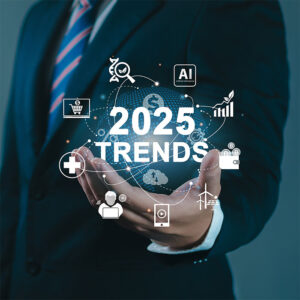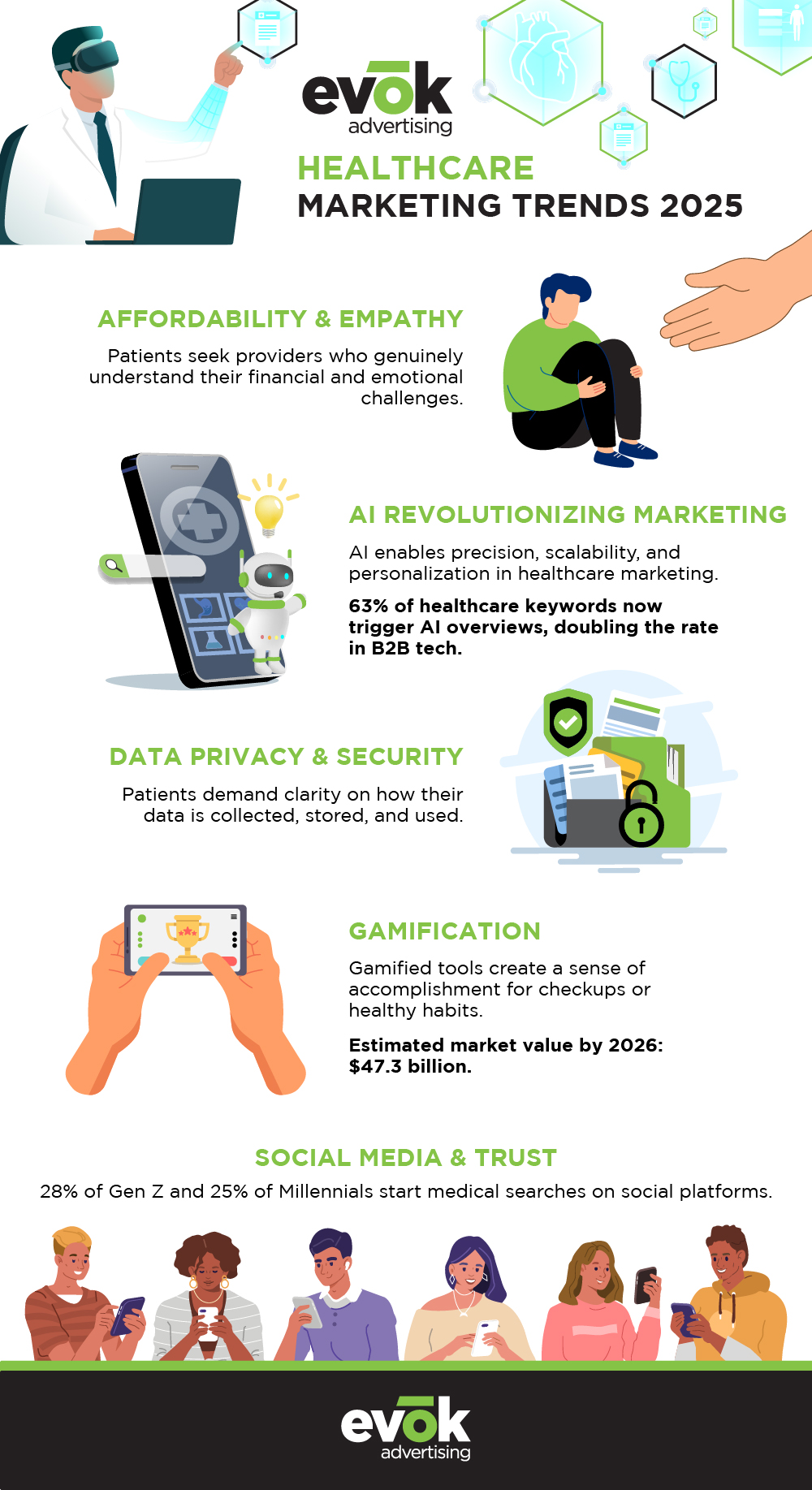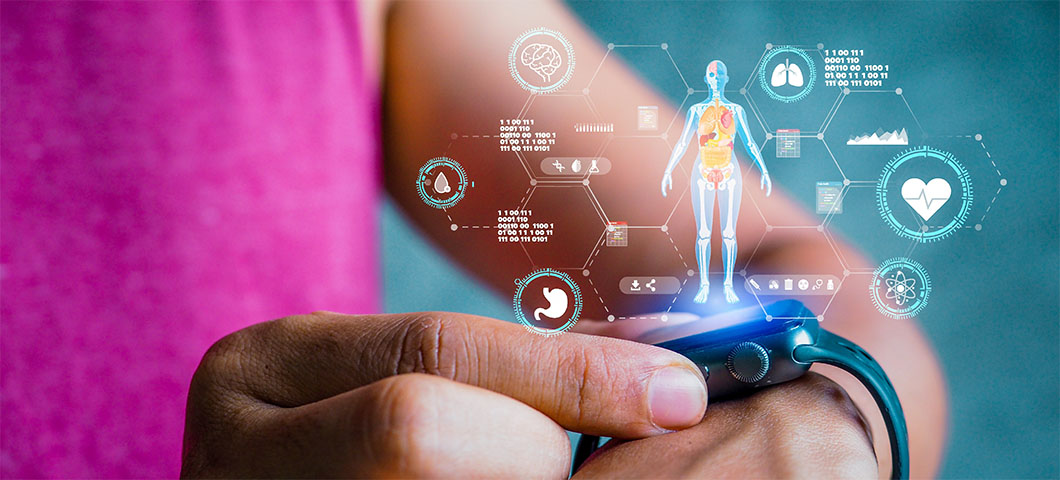
Healthcare Marketing Trends 2025: Mobile Marketing, Consumer Trends, & More!
In 2025 healthcare marketing is set to embrace groundbreaking trends, going beyond the basics of digital marketing to address the evolving needs of patients and the growing complexities of the healthcare landscape. The opportunities to revolutionize healthcare marketing efforts are vast, from leveraging artificial intelligence (AI) to enhance patient outcomes to creating trust through authentic engagement on social media platforms. But these trends also come with challenges, like navigating data privacy concerns and meeting the expectations of tech-savvy generations.
This blog goes beyond surface-level observations to deliver advanced insights into the strategies and innovations defining 2025 healthcare marketing. If your goal is to attract new patients, improve the patient experience, and establish your organization as a trusted leader in the healthcare industry, this guide is for you.
Let’s explore how your health system can keep up with and lead the charge in a competitive marketplace.

Affordability and Empathy: Cornerstones of Healthcare Marketing
In 2025, affordability and empathy will continue to be the foundation of successful healthcare marketing strategies. Patients today expect more than quality care—they seek providers who genuinely understand their financial and emotional challenges. As healthcare costs rise and the system becomes increasingly complex, connecting with potential and existing patients through compassionate and cost-conscious messaging is crucial.
Many healthcare organizations have effectively positioned themselves by emphasizing accessible care and empathetic communication in their marketing. These strategies often showcase how their services make essential care affordable for diverse populations, using emotionally resonant messaging that speaks to patients’ real-life challenges. Tailored campaigns focusing on specific demographics, such as seniors or low-income families, have effectively built trust and engagement.
Looking ahead, affordability will remain central, but the way it’s communicated is likely to evolve. By 2025, innovative approaches such as partnerships with community organizations or promoting value-based care models will take center stage. These efforts help reduce patients’ financial burdens and position healthcare organizations as champions of accessible, equitable care.
To lead in this space, brands must craft marketing campaigns to authentically prioritize empathy while addressing the practical concerns of affordability. Storytelling can play a powerful role here, using real patient experiences to illustrate how their health systems provide compassion and value. At the same time, messaging should highlight measurable outcomes—such as improved patient health achieved at a lower cost—to further reinforce trust and credibility.
By striking the right balance between empathy and cost-effectiveness, healthcare organizations can attract new patients, build lasting relationships, and differentiate themselves in an increasingly competitive market.
AI Transforming Healthcare Marketing

Artificial intelligence (AI) is revolutionizing the way healthcare organizations create and deliver marketing content. In 2025, AI tools will play an increasingly critical role in helping healthcare marketers produce highly targeted, engaging, and scalable campaigns. With 63% of keywords within the healthcare category now triggering an AI overview—nearly double the rate seen in B2B tech—AI has become a pivotal tool in healthcare marketing strategies.
By leveraging AI, healthcare organizations can gain deep insights into patient behavior, preferences, and trends. This enables marketers to craft content that speaks directly to the needs and concerns of potential and existing patients. For example, AI-powered tools can analyze search engine data to identify high-performing keywords, predict patient interests, and optimize content to improve visibility and engagement. These capabilities allow marketers to stay ahead of the curve in an increasingly competitive healthcare landscape.
AI also enables the creation of personalized content at scale. From tailored email campaigns to customized social media ads, healthcare marketers can use AI to deliver the right message to the right audience at the right time. This level of precision not only improves patient engagement but also fosters trust by demonstrating a deeper understanding of individual needs.
Moreover, AI can streamline the content creation process, saving time and resources. Tools like natural language processing (NLP) can generate blog posts, social media captions, and ad copy while ensuring consistency with brand voice and messaging. For brands, this means more efficient workflows and the ability to focus on high-level strategy while still producing high-quality, impactful marketing materials.
As AI continues to redefine what’s possible in healthcare marketing, brands have a unique opportunity to harness its potential. By integrating AI into their strategies, healthcare organizations can elevate their marketing efforts, improve patient engagement, and position themselves as leaders in the industry’s digital evolution.
Data Privacy and Security: Safeguarding Trust in the Digital Age

As healthcare organizations increasingly rely on digital marketing and advanced technologies, data privacy and security concerns are taking center stage. Patients are more aware than ever of the risks associated with data breaches, and these fears can erode trust in even the most established health systems. In 2025, healthcare marketers must address these concerns head-on to reassure potential and existing patients their information is handled with the utmost care.
Transparent communication is key to building trust in this area. Marketing efforts should clearly outline how patient data is collected, stored, and used, emphasizing robust security protocols and compliance with regulations like HIPAA. Messaging that explains the tangible benefits of data sharing—such as personalized care plans or improved health outcomes—can help alleviate concerns while demonstrating value. At the same time, organizations must be prepared to respond swiftly and transparently in the event of a security issue to maintain credibility.
Additionally, patients expect a balance between advanced technology and ethical data usage. Highlighting partnerships with trusted tech providers or certifications demonstrating a data security commitment can further strengthen trust. For brands, incorporating these assurances into digital marketing campaigns is not just a best practice but a necessity in an era where privacy concerns could significantly impact patient engagement.
By prioritizing data privacy and security in their marketing strategies, healthcare organizations can demonstrate their commitment to protecting patients while leveraging the benefits of digital innovation. This approach safeguards trust and positions health systems as responsible, patient-focused leaders in the healthcare industry.
Gamification and Engagement: Motivating Healthier Behaviors

Gamification—using game-like elements to drive engagement—is emerging as a powerful tool in healthcare marketing. By incorporating fun and interactive features into health initiatives, organizations can encourage patients to take a more active role in their care. By 2026, the Global Healthcare Gamification market is estimated to surpass $47,281.5 million as health systems seek innovative ways to connect with younger, tech-savvy demographics.
Applications integrating gamification have already demonstrated success. From fitness apps rewarding users for achieving milestones to platforms offering financial incentives for meeting health goals, gamification has proven an effective way to motivate behavioral change. For healthcare organizations, marketing these tools as part of a holistic approach to wellness can enhance patient engagement and improve outcomes.
The appeal of gamification lies in its ability to transform routine health activities into rewarding experiences. Whether earning points for completing regular health checkups or unlocking achievements for adopting healthier habits, these elements foster a sense of accomplishment and long-term commitment. Marketing campaigns highlighting these features can create excitement and drive interest among potential patients.
To fully capitalize on gamification’s potential, brands should ensure the messaging emphasizes accessibility and inclusivity. Gamified tools should feel approachable for all patients, regardless of age or technological proficiency. Additionally, campaigns should spotlight success stories from patients who have achieved meaningful health improvements through these programs.
By integrating gamification into their marketing efforts, healthcare organizations can inspire healthier behaviors, enhance patient engagement, and create memorable experiences to set them apart in a competitive marketplace. This strategy aligns with the industry’s push toward preventative care and resonates with patients seeking a more personalized and enjoyable approach to their health journey.
Social Media and Trust: Connecting with a New Generation

Social media has become a cornerstone of digital marketing, and in 2025, its role in healthcare marketing will only grow. According to EMarketer, 28% of Gen Z and 25% of Millennials begin their search for medical information on social media. For healthcare organizations, leveraging social media platforms is essential to attracting new patients, building trust, and fostering deeper engagement.
Authenticity is key to success in this space. Patients today value relatable and transparent content, and healthcare marketers must prioritize creating personally resonating posts. Whether through patient testimonials, behind-the-scenes glimpses of healthcare professionals, or educational content that simplifies complex medical concepts, relatable storytelling helps build credibility and trust. Platforms like Instagram and TikTok, emphasizing visual and video content, offer unique opportunities for healthcare organizations to showcase their human side and engage with potential patients.
Positive reviews and user-generated content (UGC) also play a critical role in enhancing trust. Patients are more likely to trust the experiences of others when making healthcare decisions. Encouraging satisfied patients to share their stories or highlight their positive experiences can amplify a health system’s credibility and influence prospective patients. Combined with targeted campaigns, these strategies can help organizations build relationships with younger demographics who prioritize connection and authenticity in their healthcare choices.
By using social media to foster trust and engagement, healthcare organizations can position themselves as approachable, patient-focused, and aligned with the values of modern consumers. This strategy not only attracts new patients but also helps strengthen the loyalty of existing ones in an increasingly competitive market.
Embracing Innovation and Empathy in 2025

The healthcare industry is poised for significant transformation in 2025, and marketing strategies must evolve to meet patients’ shifting expectations and the growing complexity of care delivery. From emphasizing affordability and leveraging technology to addressing data privacy concerns and adopting innovative engagement tactics like gamification, healthcare organizations can connect with patients in new and impactful ways.
However, at the heart of these trends lies a consistent theme: trust. Whether through authentic social media campaigns, patient-centered experiences, or transparent communication about data security, building and maintaining trust will be the cornerstone of successful healthcare marketing efforts. As competition intensifies and patients become more discerning, brands must craft strategies that combine cutting-edge innovation with genuine empathy to stand out in a crowded market. As a Healthcare Marketing Agency, we can help you navigate this exciting landscape, create marketing strategies that resonate with your audience, and position your organization as a leader in the healthcare industry. Contact us today to explore how we can help you achieve your goals in 2025 and beyond.